- Home
- Michael Swanwick
Tales of Old Earth Page 6
Tales of Old Earth Read online
Page 6
“My mother was kind of wild when she was young. I don’t think she knew who my father was. So when she had me, it was hushed up. I was raised by my grandparents. They were getting a little old for child-rearing, so they shipped me back-time to when they were younger, and raised me alongside my mother. I was fifteen before I learned she wasn’t really my sister.
“My real name is Philippe de Cherville. I swapped table assignments so I could meet my younger self. But then Melusine—my mother—started hitting on me. So I guess you can understand now—” he laughed embarrassedly—”why I didn’t want to go the Oedipus route.”
The pad flicked off, and then immediately back on again. He’d had an afterthought. “Oh yeah, I wanted to say … the things you said to me today—when I was young—the encouragement. And the tooth. Well, they meant a lot to me. So, uh … thanks.”
It flicked off.
I put my head in my hands. Everything was throbbing, as if all the universe were contained within an infected tooth. Or maybe the brain tumor of a sick old dinosaur. I’m not stupid. I saw the implications immediately.
The kid—Philippe—was my son.
Hawkins was my son.
I hadn’t even known I had a son, and now he was dead.
A bleak, blank time later, I set to work drawing time lines in the holographic workspace above my desk. A simple double-loop for Hawkins/Philippe. A rather more complex figure for myself. Then I factored in the TSOs, the waiters, the paleontologists, the musicians, the workmen who built the station in the first place and would salvage its fixtures when we were done with it … maybe a hundred representative individuals in all.
When I was done, I had a three-dimensional representation of Hilltop Station as a node of intersecting lives in time. It was one hell of a complex figure.
It looked like the Gordian knot.
Then I started crafting a memo back to my younger self. A carbon steel, razor-edged, Damascene sword of a memo. One that would slice Hilltop Station into a thousand spasming paradoxical fragments.
Hire him, fire her, strand a hundred young scientists, all fit and capable of breeding, one million years BC. Oh, and don’t father any children.
It would bring our sponsors down upon us like so many angry hornets. The Unchanging would yank time travel out of human hands—retroactively. Everything connected to it would be looped out of reality and into the disintegrative medium of quantum uncertainty. Hilltop Station would dissolve into the realm of might-have-been. The research and findings of thousands of dedicated scientists would vanish from human knowing. My son would never have been conceived or born or sent callously to an unnecessary death.
Everything I had spent my life working to accomplish would be undone.
It sounded good to me.
When the memo was done, I marked it PRIORITY and MY EYES ONLY. Then I prepared to send it three months back in time.
The door opened behind me with a click. I spun around in my chair. In walked the one man in all existence who could possibly stop me.
“The kid got to enjoy twenty-four years of life before he died,” the Old Man said. “Don’t take that away from him.”
I looked up into his eyes.
Into my own eyes.
Those eyes fascinated and repulsed me. They were deepest brown, and nested in a lifetime’s accumulation of wrinkles. I’ve been working with my older self since I first signed up with Hilltop Station, and they were still a mystery to me, absolutely opaque. They made me feel like a mouse being stared down by a snake.
“It’s not the kid,” I said. “It’s everything.”
“I know.”
“I only met him tonight—Philippe, I mean. Hawkins was just a new recruit. I barely knew him.”
The Old Man capped the Glenlivet and put it back in the liquor cabinet. Until he did that, I hadn’t even noticed I was drinking. “I keep forgetting how emotional I was when I was young,” he said.
“I don’t feel young.”
“Wait until you’re my age.”
I’m not sure how old the Old Man is. There are longevity treatments available for those who play the game, and the Old Man has been playing this lousy game so long he practically runs it. All I know is that he and I are the same person.
My thoughts took a sudden swerve. “God damn that stupid kid!” I blurted. “What was he doing outside the compound in the first place?”
The Old Man shrugged. “He was curious. All scientists are. He saw something and went out to examine it. Leave it be, kid. What’s done is done.”
I glanced at the memo I’d written. “We’ll find out.”
He placed a second memo alongside mine. “I took the liberty of writing this for you. Thought I’d spare you the pain of having to compose it.”
I picked up the memo, glanced at its contents. It was the one I’d received yesterday. “‘Hawkins was attacked and killed by Satan shortly after local midnight today,’” I quoted. “‘Take all necessary measures to control gossip.’” Overcome with loathing, I said, “This is exactly why I’m going to bust up this whole filthy system. You think I want to become the kind of man who can send his own son off to die? You think I want to become you?”
That hit home. For a long moment the Old Man did not speak. “Listen,” he said at last. “You remember that day in the Peabody?”
“You know I do.”
“I stood there in front of that mural wishing with all my heart—all your heart—that I could see a real, living dinosaur. But even then, even as an eight-year-old, I knew it wasn’t going to happen. That some things could never be.”
I said nothing.
“God hands you a miracle,” he said, “you don’t throw it back in his face.”
Then he left.
I remained.
It was my call. Two possible futures lay side-by-side on my desk, and I could select either one. The universe is inherently unstable in every instant. If paradoxes weren’t possible, nobody would waste their energy preventing them. The Old Man was trusting me to weigh all relevant factors, make the right decision, and live with the consequences.
It was the cruelest thing he had ever done to me.
Thinking of cruelty reminded me of the Old Man’s eyes. Eyes so deep you could drown in them. Eyes so dark you couldn’t tell how many corpses already lay submerged within them. After all these years working with him, I still couldn’t tell if those were the eyes of a saint or of the most evil man in the world.
There were two memos in front of me. I reached for one, hesitated, withdrew my hand. Suddenly the choice didn’t seem so easy.
The night was preternaturally still. It was as if all the world were holding its breath, waiting for me to make my decision.
I reached out for the memos.
I chose one.
4
Ancient Engines
“Planning to live forever, Tiktok?”
The words cut through the bar’s chatter and gab and silenced them. The silence reached out to touch infinity and then, “I believe you’re talking to me?” a mech said.
The drunk laughed. “Ain’t nobody else here sticking needles in his face, is there?”
The old man saw it all. He lightly touched the hand of the young woman sitting with him and said, “Watch.”
Carefully the mech set down his syringe alongside a bottle of liquid collagen on a square of velvet cloth. He disconnected himself from the recharger, laying the jack beside the syringe. When he looked up again, his face was still and hard. He looked like a young lion.
The drunk grinned sneeringly.
The bar was located just around the corner from the local stepping stage. It was a quiet retreat from the aggravations of the street, all brass and mirrors and wood paneling, as cozy and snug as the inside of a walnut. Light shifted lazily about the room, creating a varying emphasis like clouds drifting overhead on a summer day, but far dimmer. The bar, the bottles behind the bar, and the shelves beneath the bottles behind the bar were all aggress
ively real. If there was anything virtual, it was set up high or far back, where it couldn’t be touched. There was not a smart surface in the place.
“If that was a challenge,” the mech said, “I’d be more than happy to meet you outside.”
“Oh, noooooo,” the drunk said, his expression putting the lie to his words. “I just saw you shooting up that goop into your face, oh so dainty, like an old lady pumping herself full of antioxidants. So I figured …” He weaved and put a hand down on a table to steady himself. “.. figured you was hoping to live forever.”
The girl looked questioningly at the old man. He held a finger to his lips.
“Well, you’re right. You’re—what? Fifty years old? Just beginning to grow old and decay. Pretty soon your teeth will rot and fall out and your hair will melt away and your face will fold up in a million wrinkles. Your hearing and your eyesight will go and you won’t be able to remember the last time you got it up. You’ll be lucky if you don’t need diapers before the end. But me—” he drew a dram of fluid into his syringe and tapped the barrel to draw the bubbles to the top—“anything that fails, I’ll simply have it replaced. So, yes, I’m planning to live forever. While you, well, I suppose you’re planning to die. Soon, I hope.”
The drunk’s face twisted, and with an incoherent roar of rage he attacked the mech.
In a motion too fast to be seen, the mech stood, seized the drunk, whirled him around, and lifted him above his head. One hand was closed around the man’s throat so he couldn’t speak. The other held both wrists tight behind the knees so that, struggle as he might, the drunk was helpless.
“I could snap your spine like that,” he said coldly. “If I exerted myself, I could rupture every internal organ you’ve got. I’m two-point-eight times stronger than a flesh man, and three-point-five times faster. My reflexes are only slightly slower than the speed of light, and I’ve just had a tune-up. You could hardly have chosen a worse person to pick a fight with.”
Then the drunk was flipped around and set back on his feet. He gasped for air.
“But since I’m also a merciful man, I’ll simply ask nicely if you wouldn’t rather leave.” The mech spun the drunk around and gave him a gentle shove toward the door.
The man left at a stumbling run.
Everyone in the place—there were not many—had been watching. Now they remembered their drinks, and talk rose up to fill the room again. The bartender put something back under the bar and turned away.
Leaving his recharge incomplete, the mech folded up his lubrication kit and slipped it in a pocket. He swiped his hand over the credit swatch, and stood.
But as he was leaving, the old man swiveled around and said, “I heard you say you hope to live forever. Is that true?”
“Who doesn’t?” the mech said curtly.
“Then sit down. Spend a few minutes out of the infinite swarm of centuries you’ve got ahead of you to humor an old man. What’s so urgent that you can’t spare the time?”
The mech hesitated. Then, as the young woman smiled at him, he sat.
“Thank you. My name is—”
“I know who you are, Mr. Brandt. There’s nothing wrong with my eidetics.”
Brandt smiled. “That’s why I like you guys. I don’t have to be all the time reminding you of things.” He gestured to the woman sitting opposite him. “My granddaughter.” The light intensified where she sat, making her red hair blaze. She dimpled prettily.
“Jack.” The young man drew up a chair. “Chimaera Navigator-Fuego, model number—”
“Please. I founded Chimaera. Do you think I wouldn’t recognize one of my own children?”
Jack flushed. “What is it you want to talk about, Mr. Brandt?” His voice was audibly less hostile now, as synthetic counter hormones damped down his emotions.
“Immortality. I found your ambition most intriguing.”
“What’s to say? I take care of myself, I invest carefully, I buy all the upgrades. I see no reason why I shouldn’t live forever.” Defiantly. “I hope that doesn’t offend you.”
“No, no, of course not. Why should it? Some men hope to achieve immortality through their works and others through their children. What could give me more joy than to do both? But tell me—do you really expect to live forever?”
The mech said nothing.
“I remember an incident happened to my late father-in-law, William Porter. He was a fine fellow, Bill was, and who remembers him anymore? Only me.” The old man sighed. “He was a bit of a railroad buff, and one day he took a tour through a science museum that included a magnificent old steam locomotive. This was in the latter years of the last century. Well, he was listening admiringly to the guide extolling the virtues of this ancient engine when she mentioned its date of manufacture, and he realized that he was older than it was.” Brandt leaned forward. “This is the point where old Bill would laugh. But it’s not really funny, is it?
“No.”
The granddaughter sat listening quietly, intently, eating little pretzels one by one from a bowl.
“How old are you, Jack?”
“Seven years.”
“I’m eighty-three. How many machines do you know of that are as old as me? Eighty-three years old and still functioning?”
“I saw an automobile the other day,” his granddaughter said. “A Dusenberg. It was red.”
“How delightful. But it’s not used for transportation anymore, is it? We have the stepping stages for that. I won an award once that had mounted on it a vacuum tube from Univac. That was the first real computer. Yet all its fame and historical importance couldn’t keep it from the scrap heap.”
“Univac,” said the young man, “couldn’t act on its own behalf. If it could, perhaps it would be alive today.”
“Parts wear out.”
“New ones can be bought.”
“Yes, as long as there’s the market. But there are only so many machine people of your make and model. A lot of you have risky occupations. There are accidents, and with every accident, the consumer market dwindles.”
“You can buy antique parts. You can have them made.”
“Yes, if you can afford them. And if not—?”
The young man fell silent.
“Son, you’re not going to live forever. We’ve just established that. So now that you’ve admitted that you’ve got to die someday, you might as well admit that it’s going to be sooner rather than later. Mechanical people are in their infancy. And nobody can upgrade a Model T into a stepping stage. Agreed?”
Jack dipped his head. “Yes.”
“You knew it all along.”
“Yes.”
“That’s why you behaved so badly toward that lush.”
“Yes.”
“I’m going to be brutal here, Jack—you probably won’t live to be eighty-three. You don’t have my advantages.”
“Which are?”
“Good genes. I chose my ancestors well.”
“Good genes,” Jack said bitterly. “You received good genes and what did I get in their place? What the hell did I get?”
“Molybdenum joints where stainless steel would do. Ruby chips instead of zirconium. A number seventeen plastic seating for—hell, we did all right by you boys.”
“But it’s not enough.”
“No. It’s not. It was only the best we could do.”
“What’s the solution, then?” the granddaughter asked, smiling.
“I’d advise taking the long view. That’s what I’ve done.”
“Poppycock,” the mech said. “You were an extensionist when you were young. I input your autobiography. It seems to me you wanted immortality as much as I do.”
“Oh, yes, I was a charter member of the life-extension movement. You can’t imagine the crap we put into our bodies! But eventually I wised up. The problem is, information degrades each time a human cell replenishes itself. Death is inherent in flesh people. It seems to be written into the basic program—a way, perhaps, of ke
eping the universe from filling up with old people.”
“And old ideas,” his granddaughter said maliciously.
“Touché. I saw that life-extension was a failure. So I decided that my children would succeed where I failed. That you would succeed. And—”
“You failed.”
“But I haven’t stopped trying!” The old man thumped the table in unison with his last three words. “You’ve obviously given this some thought. Let’s discuss what I should have done. What would it take to make a true immortal? What instructions should I have given your design team? Let’s design a mechanical man who’s got a shot at living forever.”
Carefully, the mech said, “Well, the obvious to begin with. He ought to be able to buy new parts and upgrades as they come available. There should be ports and connectors that would make it easy to adjust to shifts in technology. He should be capable of surviving extremes of heat, cold, and moisture. And—” he waved a hand at his own face—“he shouldn’t look so goddamned pretty.”
“I think you look nice,” the granddaughter said.
“Yes, but I’d like to be able to pass for flesh.”
“So our hypothetical immortal should be, one, infinitely upgradable; two, adaptable across a broad spectrum of conditions; and three, discreet. Anything else?”
“I think she should be charming,” the granddaughter said.
“She?” the mech asked.
“Why not?”
“That’s actually not a bad point,” the old man said. “The organism that survives evolutionary forces is the one that’s best adapted to its environmental niche. The environmental niche people live in is man-made. The single most useful trait a survivor can have is probably the ability to get along easily with other men. Or, if you’d rather, women.”
“Oh,” said the granddaughter, “he doesn’t like women. I can tell by his body language.”
The young man flushed.
“Don’t be offended,” said the old man. “You should never be offended by the truth. As for you—” he turned to face his granddaughter—“if you don’t learn to treat people better, I won’t take you places anymore.”

 The New Prometheus
The New Prometheus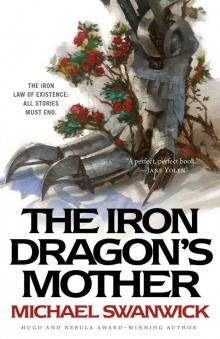 The Iron Dragon’s Mother
The Iron Dragon’s Mother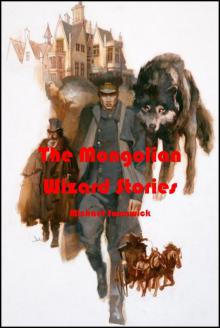 The Mongolian Wizard Stories
The Mongolian Wizard Stories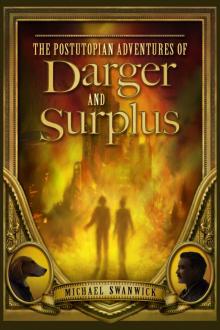 The Postutopian Adventures of Darger and Surplus
The Postutopian Adventures of Darger and Surplus Day of the Kraken
Day of the Kraken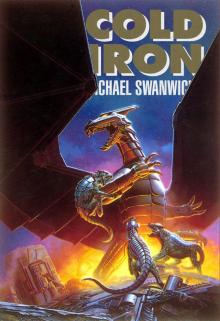 Cold Iron
Cold Iron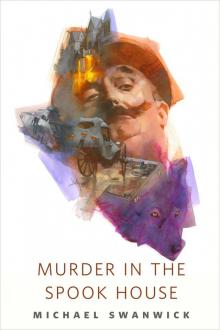 Murder in the Spook House: A Tor.com Original
Murder in the Spook House: A Tor.com Original Radio Waves
Radio Waves The New Prometheus: A Tor.com Original
The New Prometheus: A Tor.com Original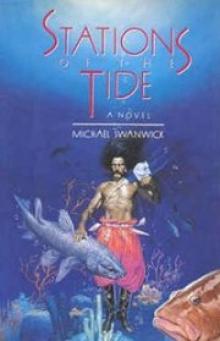 Stations of the Tide
Stations of the Tide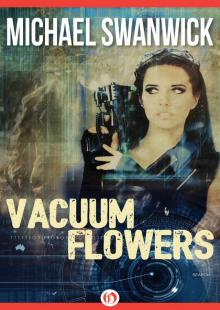 Vacuum Flowers
Vacuum Flowers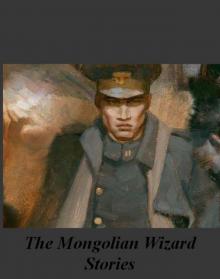 The Mongolian Wizard Stories (online stories 1-7)
The Mongolian Wizard Stories (online stories 1-7)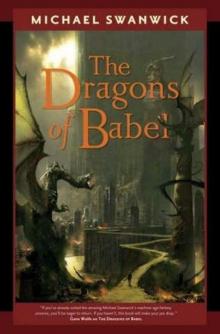 The Dragons of Babel
The Dragons of Babel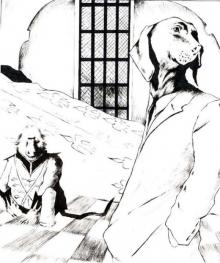 The Dog Said Bow-Wow
The Dog Said Bow-Wow Griffin's Egg
Griffin's Egg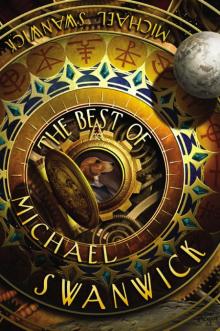 The Best of Michael Swanwick
The Best of Michael Swanwick Not So Much, Said the Cat
Not So Much, Said the Cat In the Drift
In the Drift Vacumn Flowers
Vacumn Flowers Slow Life
Slow Life The Wisdom Of Old Earth
The Wisdom Of Old Earth Legions In Time
Legions In Time Scherzo with Tyrannosaur
Scherzo with Tyrannosaur The Year's Best Science Fiction (2008 Edition)
The Year's Best Science Fiction (2008 Edition)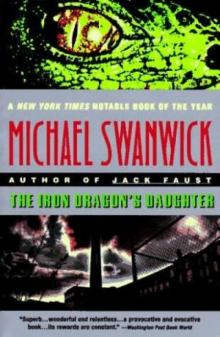 The Iron Dragon's Daughter
The Iron Dragon's Daughter The Very Pulse of the Machine
The Very Pulse of the Machine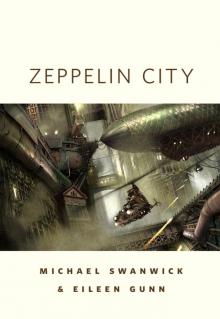 Zeppelin City
Zeppelin City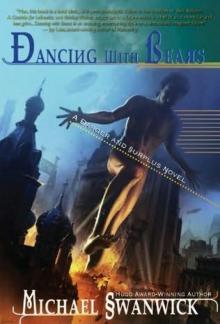 Dancing with Bears
Dancing with Bears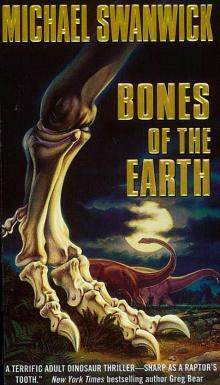 Bones of the Earth
Bones of the Earth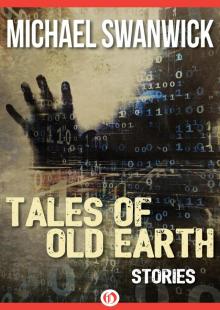 Tales of Old Earth
Tales of Old Earth Trojan Horse
Trojan Horse Radiant Doors
Radiant Doors